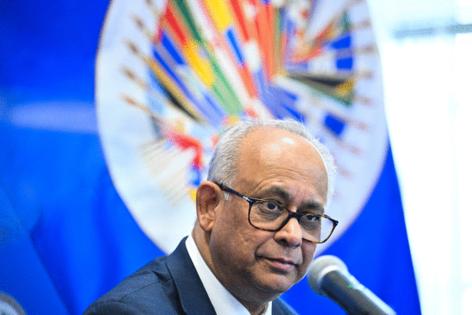Under new leadership, OAS is determined to show progress on Haiti
Published in News & Features
Amid pressure from Washington to resolve the crisis in Haiti, the new head of the Western Hemisphere’s top multilateral organization pledged to work with the United Nations and international donors to chart a road map for peace in the violence-torn island nation.
In an interview, Organization of American States Secretary General Albert Ramdin described finding a solution for Haiti as a “moral obligation.”
The Caribbean nation has suffered a prolonged economic and political slide. Violent gangs control most of the capital and large swaths of land outside it, spurring more than 1.3 million to flee their homes in one of the globe’s largest forced displacements in years. The gang turf wars have been marked by rampant lawlessness, massacres and growing hunger.
“The U.N. and the OAS have the opportunity to work together on Haiti closely,” Ramdin said, underscoring that only the global body has the remit to deploy international security forces to the country. “We want to work with the U.N. to see how we can facilitate this process,” he explained.
“And then we’ll need a lot of money.”
A former foreign minister of Suriname, Ramdin is well-positioned to lead a fresh push on Haiti. Not only is he the first OAS chief from the Caribbean, but he also touts firsthand experience in the former French colony. Ramdin served for a decade as deputy chief of the OAS ending in 2015, leading an initiative to mobilize support after Haiti’s devastating 2010 earthquake. In its aftermath, he helped to mediate a contentious presidential election.
The seasoned diplomat noted he will prioritize a major fundraising effort to improve conditions on the ground. That strategy includes meetings with U.S., French and Spanish officials, plus other potential financial backers, by mid-July. He said he expects to hold a broader donor conference before the end of the year.
But he acknowledged he cannot provide an estimate for how much peace in Haiti will cost. “I don’t have a number as yet,” he said.
The OAS, which traces its roots back to the 1890s, includes nearly all nations in the Americas except Nicaragua and Cuba. The consensus-oriented body tackles regional problems by using its megaphone to apply pressure while persuading member-states to take action. But its powers are limited as it does not command its own forces, and its own financial muscle is small.
Further complicating its efforts, the Trump administration is often dismissive of multilateral organizations like the OAS. During a hearing last month before U.S. lawmakers, Secretary of State Marco Rubio derided the group’s inability to respond to Haiti. “You would think that one of the reasons why the OAS exists is to deal with a crisis like the one we have in Haiti,” he said.
Rally the Region
Ramdin, 67, was elected in March to lead the Washington-based OAS for a five-year term, succeeding Uruguayan diplomat Luis Almagro.
His leadership comes as migration, transnational crime and economic uncertainty roil the region.
Ramdin insists he’s aware of the skepticism toward the institution and says he’s open to reform. “We want to strengthen the OAS as an institution, making it more relevant, revitalize its function, its capability,” he said.
In an interview last month, the then-outgoing top Trump envoy to Latin America was upbeat on Ramdin’s ability to meet the moment.
Not only did Mauricio Claver-Carone tout the new OAS leader’s unique experience, but he also argued that Trump’s designation of Haitian gangs as terrorist groups earlier this year should help rein in the violence.
“Haitian gangs don’t want to end up at CECOT,” Claver-Carone said, referring to the notorious Salvadoran prison where the United States has sent Venezuelan deportees it says are gang members. He went on to suggest that well-trained Colombian or Salvadoran soldiers could be deployed to Haiti under the new OAS leader, once the mandate of a U.N.-backed Kenyan-led force there ends in October.
For his part, Ramdin stressed that a focus on improving the lives of Haitians can rally the region to act, and help overcome the “divisive atmosphere” that has hampered collective action on regional hotspots in the recent past.
Haiti was already the poorest nation in the Americas, but both security and political conditions worsened significantly following the 2021 assassination of President Jovenel Moise. No elections have been held since 2016, and the multinational security force dominated by a few hundred Kenyan soldiers has largely failed to show results.
“I have never seen in one country all these issues — political, governance, economic, social, environmental, poverty, crime,” Ramdin said.
Fixing it won’t be easy, he cautioned, and will require input from all sides.
“Anybody who thinks that we can solve all these problems quickly will have to revisit that.”
©2025 Bloomberg L.P. Visit bloomberg.com. Distributed by Tribune Content Agency, LLC.







Comments